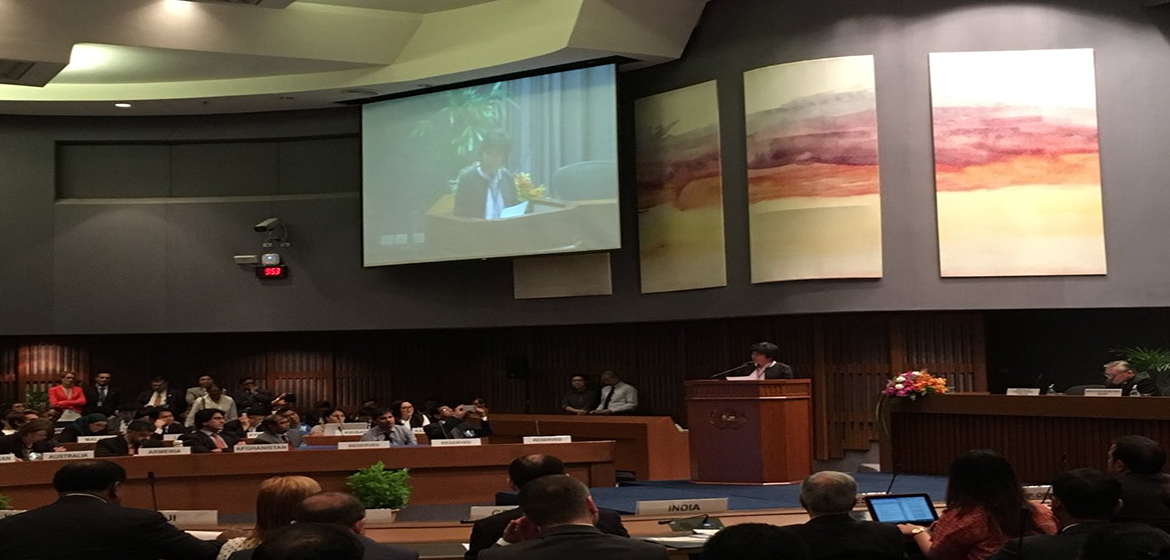5th Session of the Asia-Pacific Forum on Sustainable Development
March 278-30,2018
UNESCAP, Bangkok, Thailand
Opening Remarks Joan Carling on behalf of Civil Society Organizations
I am proud to be an indigenous human rights defender and activist for more than 30 years. I come from the Cordillera region in the Philippines which is the homeland of indigenous peoples. During my youthful years, I have worked with the neighboring Kalinga tribes who have strong indigenous institutions and are proud of their cultures. In the early 70s to 80s, they have prevented the construction of four large dams along the Chico river that would have submerged their rice fields, villages and forest. Their sustained opposition to the dam projects resulted in massive arbitrary arrests and detention, and the killing of tribal leaders. Yet they remain steadfast, and continue to manage their resources in a sustainable way. This earlier struggle of the Cordillera Peoples had inspired me to commit myself to advancing indigenous peoples rights, human rights and environment protection. I have thereby been at the forefront of campaigns against development aggression from large mining, agribusiness, hydro power, mega tourism, as part of the indigenous movement.
Are we thereby anti-development? NO! We, as indigenous peoples are in fact pursuing sustainable development that cares for nature and peoples. We collectively manage our lands and resources for the present and future generations. We are opposing development that causes destruction, conflicts, displacements, hunger, environmental problems and worsening inequality and human rights violations.
As the world is now embarking on a global agenda to achieve sustainable development, we need to recognize that peoples are the real actors. Indigenous peoples’ territories are the home of 60% of the world’s biodiversity which is their greatest contribution to sustainable development, yet their rights to their territories are not secured. Small farmers are producing 70 % of the world food, yet most of them are hungry and landless. Workers who have created the greatest wealth are underpaid, poor and live shorter lives. Women who take care of our children, protect nature and work tirelessly, experience violence and discrimination everywhere. These are the people who have given and sacrificed the most, yet are not recognized for their roles and contributions to development. However, those that are destroying massively the environment and exploiting labor of men and women are still deciding our development path.
With the theme of “Transformation towards sustainable and resilient societies”, we need to address the structural barriers and ensure the enabling environment for people to be empowered and contribute. Accountable governance and respect and protection of human rights are necessary in creating an enabling environment. Mechanisms for the democratic participation of peoples are imperative, instead of repression and criminalization of peoples’ movements, environment and human rights defenders.
An inclusive and bottom-up approach to development planning with the most vulnerable and marginalized groups—indigenous peoples, persons with disabilities, migrants, women, LGBTIQ, elderly and young people among others –ensures that their specific needs and aspirations are fully integrated and their effective participation in implementation and monitoring shall be guaranteed. Building resilience means empowering communities to take control of their development and future.
Resilience and sustainability will only be achieved by putting people and nature at the center and pursuing shared but differentiated roles, responsibilities and actions that bring different sectors and groups, institutions, governments and business to work together. We need new avenues and platforms for partnerships and cooperation that are grounded in the principle of accountability of states, corporations and investors who have the power and resources to undertake transformational actions.
As we are now in the third year of implementation of the 2030 Agenda - with a pledge of leaving no one behind - we need stronger political will and more concerted actions from all of us to dismantle the systemic barriers, ensure policy cohesion and provide an enabling environment for peoples’ effective participation and empowerment. Thank you.



